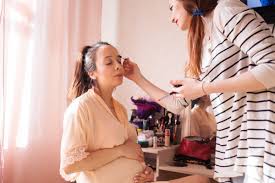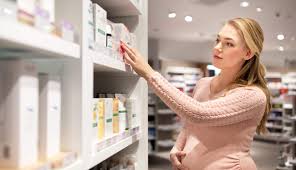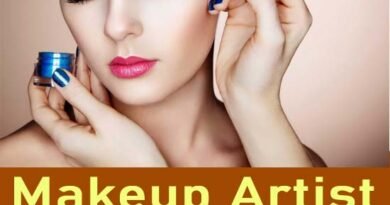Cosmetics During Pregnancy

Makeup Ingredients to Avoid During Pregnancy
Chances are, seeing that positive pregnancy test has propelled you
into clean living mode—you’ve re-stocked your fridge with organic
foods and swapped regular cleaning products for toxin-free options.
But did you check the contents of your makeup bag?
The truth is, those innocuous-looking tubes and bottles in your
medicine cabinet could be filled with chemicals that might affect your
pregnancy and growing baby. Even products with labels like
“natural” and “organic” could contain harmful ingredients. And since
your skin absorbs about 60 percent of what you put on it, you’ll need
to be extra-careful. So what’s a mom-to-be to do?
Start by reading the fine print on packaging and labels. “Lists are
always ordered from largest to smallest in terms of ingredient
quantity,” says Mary Irwin, New York–based makeup artist. “Remember, the first three things listed will be the
most active. Also, the smaller the list, the less likely you are to have a reaction.”
Words like “triglyceride” and “retinyl palmitate” can trigger chem class nightmares, but you can easily decode the
scientific terminology on the Environmental Working Group’s Skin Deep database. Bonus: This organization has
evaluated almost 74,000 products, giving each a safety score, so you can check how your current skincare and
makeup products measure up.
Here’s a cheat sheet of the ingredients common beauty products often contain that you’ll want to skip, at least
until the baby is born—and some suggestions for pregnancy-safe products to try instead.
In this article:
Foundation, concealer and exfoliators
Lipstick and blush
Eye shadow and mascara
Nail polish
Sunscreen
Foundation, Concealer and Exfoliators
The next 40 weeks can certainly wreak havoc on your skin. “During pregnancy the skin is often turning over more
quickly, so you can accumulate dead skin and sometimes require more foundation,” says Shilpi Agarwal, MD,
author of The 10-Day Total Body Transformation and board-certified family medicine physician in Washington,
DC. What’s more, some women deal with hormone-induced acne that will begin to be covered up. Camouflaging
distraught skin can be particularly tricky, especially when it’s sensitive.
Ingredients to avoid
- Parabens. These preservative agents (also known as propylparaben, butylparaben, isopropylparaben and
methylparabens) are used in foundation and lipstick to keep them from harboring bacteria. Parabens have been
associated with developmental, reproductive, neurological and immune disruptions in babies because they can
be passed to the fetus. - Retinol. This form of vitamin A (also known as retinyl palmitate, retinyl acetate, retinoic acid and tretinoin) can
be found in foundations and lipstick, specifically those labeled as “anti-aging.” Too much vitamin A has been
linked to fetal malformation and even early term miscarriages. It is best to avoid it completely. - Fragrance. Some companies lump potentially hazardous substances under the guise of the
innocent-sounding “fragrance.” These are some examples of what could be lurking in your makeup undetected:
phthalates associated with reproductive system defects in baby boys; octoxynol, another group of hormone
disruptors; citral, eugenol, coumarin and geraniol—chemicals that may increase chances of allergies and contact
dermatitis.

Products to try instead
Say hello to BB creams and CC creams. Not only do the formulas tend to go on lighter, but according to
Environmental Working Group research, these formulas have an average of 40 ingredients, compared with an
average of 70 ingredients when foundation, concealer and moisturizing sunscreen are used separately. Juice
Beauty Stem Cellular CC Cream uses no artificial dyes, complements all skin types and imparts a dewy glow.
Incorporate a gentle exfoliator prior to your beauty routine. We like the honey-based Josh Rosebrook Active
Enzyme Exfoliator with anti-inflammatory chamomile and turmeric. “Exfoliating sloughs off dead skin so you’ll
need less makeup. You can get away with using just a paraben-free powder instead of foundation,” Agarwal
says. Try Red Earth Why Worry Mineral Loose Powder; it’s made from
silica, not talc, and goes on smoothly.
Another trick is investing in a good concealer. “I can hide my blemishes
without having to cover my entire face in makeup,” says mom-to-be
Diane Elizabeth, founder of Skin Care Ox, an organic beauty advice
website. She loves Omiana Adaptive Concealing Cream because it’s
made with castor seed and coconut oils, which help hide blemishes
without leaving a cakey residue.
Lipstick and Blush
When uncomfortable pregnancy symptoms are getting you down, a
bright lip and a swipe of blush can brighten your look. But pick your products carefully—some makeup contains
ingredients that can actually make your skin issues worse.
Ingredients to avoid- Preservatives. Some stabilizing agents, like phenoxyethanol and benzyl benzoate, don’t pose harm to your
reproductive system or to the baby, but they might aggravate your already sensitive skin. - Artificial dyes. The Campaign for Safe Cosmetics has reported that some of the most popular drugstore
and department store brands of lipstick contain trace amounts of lead. The FDA says most color additives in lip
products are very small and that incidental ingestion of up to 10 parts per million of lead cannot be measured in
blood testing. But given the fact that lead ingestion causes neurotoxicity, fertility issues and hormonal changes,
you may not want to risk any exposure. To brighten up your look, shop 100% Pure—their vivid lipsticks and blush
palettes are made with fruit pigment, not mystery dyes.

- Retinol. (See above) • Parabens. (See above) • Fragrance. (See above)
Products to try instead
Morning sickness and extreme fatigue in those first few weeks of pregnancy can dull even the brightest of
pregnancy glows. “I suggest using blush to avoid that yellow-green look,” Agarwal says. To fake that natural
rouge, try Amareta Natural Flush All Over Color. It comes in universally flattering shades that enhance your
complexion without looking like you have a trace of makeup on.
Agarwal also suggests a minty lip balm to calm the nausea. Burt’s Bees Beeswax Lip Balm with Vitamin E and
Peppermint does the trick; it’s made with sunflower oil that helps lock in moisture to prevent lips from chapping.
Eye Shadow and Mascara
Eye makeup may not take up too much real estate on your face, but there are still ingredients you should watch
out for. What’s more, some pregnant women develop eye irritation and itchiness, so you’ll want to invest in
natural, hypoallergenic products.
Ingredients to avoid - Aluminum powder. It may make your eyeshadow shimmery, but aluminum powder can be absorbed by
skin, flagging neurotoxicity and respiratory concern. “Matte eye shadows are less likely to contain aluminum,”
Agarwal says. - Talc. Its job is to prevent caking and it’s generally harmless on its own. The problem is small amounts of
asbestos, a known carcinogen, may contaminate mined talc deposits and end up in your powdered eye shadow. - Diazolidinyl urea. This antimicrobial preservative is found in mascara and releases formaldehyde.
Products to try instead
If you’re still looking for a natural shimmer, give RMS Beauty Eye Polish
a try. It comes in eight luminous shades from mica, a silicate material
found in crystals. Another safe shadow that’s completely free of talc and
artificial dyes is Nu Evolution eye shadow.
There’s nothing like long lashes to make a mom-to-be feel super-sexy.
For a pregnancy-safe mascara, try Inika Organic Long Lash Vegan
Mascara, which is 100 percent plant derived.
Nail Polish
Manicures and pedicures during pregnancy can be tricky—and not just
because you’ll have trouble reaching your toes. There’s no concrete
evidence that polish during pregnancy will have lasting effects on the baby, so long as you stick to varieties that
don’t contain the following toxic trio.
Makeup ingredients to avoid - Dibutyl phthalate (DBP). This phthalate is a known hormone disruptor. Exposure to high concentrations
may cause hormone production problems in a developing baby. - Formaldehyde. Formaldehyde can cause cancer. Enough said.
- Toluene. This neurotoxin can have a severe impact on the nervous system. It’s also linked to dizziness and
irritation to the body, including reproductive issues.
Products to try instead
Nail polish brands are jumping on the safety bandwagon and creating cleaner formulas with 5-free and 7-free
promises. We like NCLA vegan nail lacquers—they span almost 200 colors—as well as the new purple Pantone
Collection from butter LONDON, which stepped it up by nixing eight toxic ingredients.
Sunscreen
You already know to wear broad-spectrum sunscreen that shields UVA and UVB rays, but it’s even more crucial
to boost your SPF application during pregnancy to avoid dark spots. Melasma, referred to as the “mask of
pregnancy,” is a condition resulting from an increase in hormones that increase skin pigmentation—almost 50
percent of pregnant women show signs on their forehead and cheeks. Just make your sunscreen selections
carefully, as some contain ingredients that are less than ideal when you’re expecting.
Ingredients to avoid

- Oxybenzone. This popular sunscreen ingredient may absorb UV rays, but it’s soaked up by your skin more
than other sunscreen ingredients. A Swiss study also found traces of sunscreen in breast milk. While an [animal
study] showed that exposure to oxybenzone resulted in fewer egg hatchings in trout, a study in JAMA
Dermatology did not find significant endocrine disruption in humans who applied oxybenzone. Still, you may want
to skip it. - Avobenzone. A Dutch study showed that this ingredient may mimic the female hormone progesterone and
possibly interfere with sperm function.
Products to try instead
To avoid dark spots, look for makeup with a SPF 15 or higher. “A tinted moisturizer with sunscreen will make a
big difference in averting long-term discoloration,” Irwin says. We recommend Juice Beauty SPF 30 Tinted
Mineral Moisturizer, not only because the EWG rates as a “1” on their toxicity scale (which is the safest rating),
but also because it’s super hydrating, thanks to jojoba, sunflower and coconut oils.
You might also want to invest in products that contain vitamin C, which may save you from melasma. “Look for
products with squalane, a saturated and stable hydrocarbon found naturally in the skin,” Irwin adds. The luxe
Biossance Squalane + Vitamin C Rose Oil fits the bill.
Makeup products with SPF are great for daily low-exposure activities like driving and brief walks outside, but
they’re not meant to replace sunscreen on longer outings with intense sunlight. “Use a zinc-based SPF for
prolonged exposure,” Agarwal says. “It protects from sun rays more effectively and has no harmful effects on the
baby.” La Bella Donna Sun SPF 50 is a translucent powder mineral face sunscreen that won’t clog pores and
contains zinc oxide and titanium dioxide, both deemed safe during pregnancy



